初中英语介词讲解汇编
中考介词汇编(word)
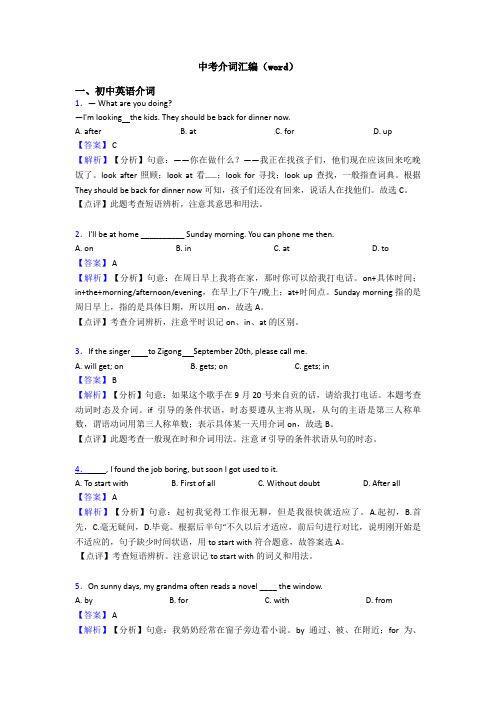
中考介词汇编(word)一、初中英语介词1.— What are you doing?—I'm looking the kids. They should be back for dinner now.A. afterB. atC. forD. up【答案】 C【解析】【分析】句意:——你在做什么?——我正在找孩子们,他们现在应该回来吃晚饭了。
look after 照顾;look at 看……;look for 寻找;look up 查找,一般指查词典。
根据They should be back for dinner now可知,孩子们还没有回来,说话人在找他们。
故选C。
【点评】此题考查短语辨析,注意其意思和用法。
2.I'll be at home __________ Sunday morning. You can phone me then.A. onB. inC. atD. to【答案】 A【解析】【分析】句意:在周日早上我将在家,那时你可以给我打电话。
on+具体时间;in+the+morning/afternoon/evening,在早上/下午/晚上;at+时间点。
Sunday morning指的是周日早上,指的是具体日期,所以用on,故选A。
【点评】考查介词辨析,注意平时识记on、in、at的区别。
3.If the singer to Zigong September 20th, please call me.A. will get; onB. gets; onC. gets; in【答案】 B【解析】【分析】句意:如果这个歌手在9月20号来自贡的话,请给我打电话。
本题考查动词时态及介词。
if 引导的条件状语,时态要遵从主将从现,从句的主语是第三人称单数,谓语动词用第三人称单数;表示具体某一天用介词on,故选B。
【点评】此题考查一般现在时和介词用法。
注意if引导的条件状语从句的时态。
初中英语介词用法总结
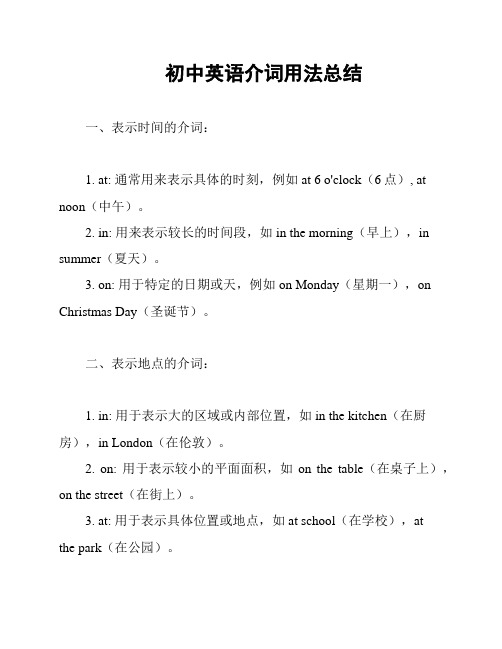
初中英语介词用法总结一、表示时间的介词:1. at: 通常用来表示具体的时刻,例如 at 6 o'clock(6点), at noon(中午)。
2. in: 用来表示较长的时间段,如 in the morning(早上),in summer(夏天)。
3. on: 用于特定的日期或天,例如 on Monday(星期一),on Christmas Day(圣诞节)。
二、表示地点的介词:1. in: 用于表示大的区域或内部位置,如 in the kitchen(在厨房),in London(在伦敦)。
2. on: 用于表示较小的平面面积,如on the table(在桌子上),on the street(在街上)。
3. at: 用于表示具体位置或地点,如 at school(在学校),atthe park(在公园)。
三、表示方式、方式、原因的介词:1. by: 表示通过某种方式或手段,如 by bus(乘公交车),by email(通过电子邮件)。
2. with: 表示伴随或使用某物,如with friends(和朋友一起),with a pen(用一支笔)。
3. for: 表示目的或原因,如 for fun(为了好玩),for the reason (因为...)。
四、表示动作方向的介词:1. to: 表示运动或行动的方向,如 go to school(去学校),send a letter to(寄一封信给)。
2. into: 表示进入某个内部空间,如 jump into the pool(跳进游泳池)。
五、表示关系和连接的介词:1. of: 表示所有关系,如 a photo of my family(我家的照片)。
2. with: 表示随同或具有某种关系,如 a girl with long hair(一位长发的女孩)。
3. to: 表示某种连接或关联,如 the key to the door(开门的钥匙)。
初中英语知识点归纳介词的用法
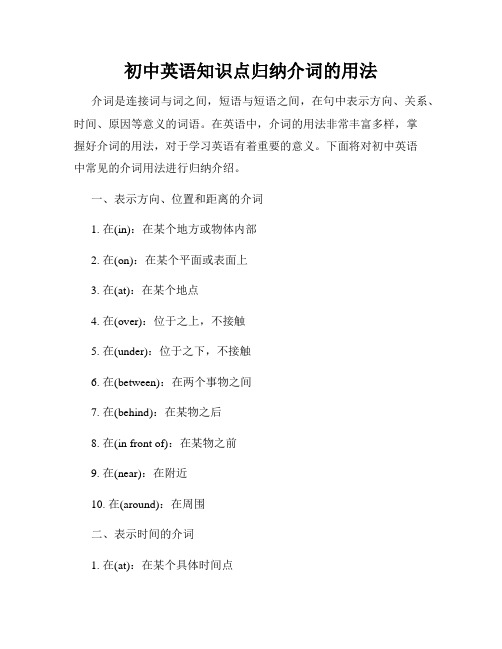
初中英语知识点归纳介词的用法介词是连接词与词之间,短语与短语之间,在句中表示方向、关系、时间、原因等意义的词语。
在英语中,介词的用法非常丰富多样,掌握好介词的用法,对于学习英语有着重要的意义。
下面将对初中英语中常见的介词用法进行归纳介绍。
一、表示方向、位置和距离的介词1. 在(in):在某个地方或物体内部2. 在(on):在某个平面或表面上3. 在(at):在某个地点4. 在(over):位于之上,不接触5. 在(under):位于之下,不接触6. 在(between):在两个事物之间7. 在(behind):在某物之后8. 在(in front of):在某物之前9. 在(near):在附近10. 在(around):在周围二、表示时间的介词1. 在(at):在某个具体时间点2. 在(in):在某个时间段3. 在(on):在某个具体日期三、表示原因的介词1. 因为(of):表示原因、缘故2. 由于(because of):表示原因、由于四、表示目的、用途和方式的介词1. 为了(in order to):表示目的2. 以便(in order that):表示目的3. 用(with):表示使用的手段或工具4. 通过(by):表示方式、方法5. 以(for):表示目的五、表示比较的介词1. 比较起见(than):表示比较的对象2. 和(with):与某人或某物在一起六、其它常见的介词1. 关于(about):表示涉及某一话题2. 靠(by):表示接近某人或某物3. 经过(through):表示通过某地或某事4. 编写(at):表示在某地工作或活动5. 因(as):表示角色、身份6. 例如(for example):表示举例7. 包括(including):表示包含某物以上是初中英语中常见的介词用法的归纳总结。
熟练掌握这些介词的用法,对于构建正确的句子和语法结构非常重要。
希望能对你的学习有所帮助。
中考英语介词知识点精讲大全
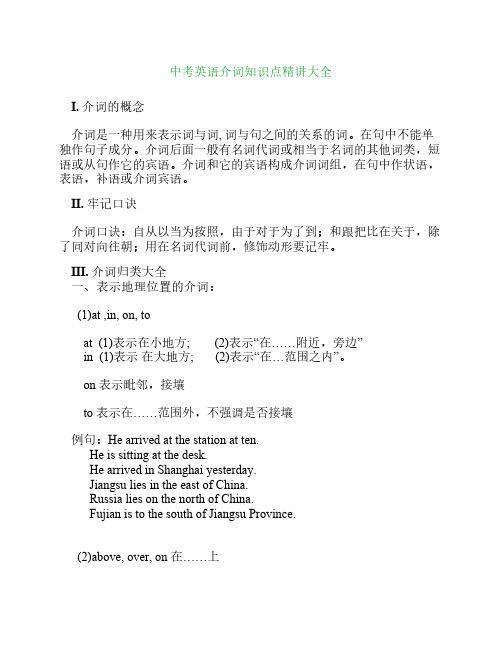
中考英语介词知识点精讲大全I. 介词的概念介词是一种用来表示词与词, 词与句之间的关系的词。
在句中不能单独作句子成分。
介词后面一般有名词代词或相当于名词的其他词类,短语或从句作它的宾语。
介词和它的宾语构成介词词组,在句中作状语,表语,补语或介词宾语。
II. 牢记口诀介词口诀:自从以当为按照,由于对于为了到;和跟把比在关于,除了同对向往朝;用在名词代词前,修饰动形要记牢。
III. 介词归类大全一、表示地理位置的介词:(1)at ,in, on, toat (1)表示在小地方; (2)表示“在……附近,旁边”in (1)表示在大地方; (2)表示“在…范围之内”。
on 表示毗邻,接壤to 表示在……范围外,不强调是否接壤例句:He arrived at the station at ten.He is sitting at the desk.He arrived in Shanghai yesterday.Jiangsu lies in the east of China.Russia lies on the north of China.Fujian is to the south of Jiangsu Province.(2)above, over, on 在……上above 指在……上方,不强调是否垂直,与 below相对;over指垂直的上方,与under相对,但over与物体有一定的空间,不直接接触。
on表示某物体上面并与之接触。
例句:The bird is flying above my head.There is a bridge over the river.He put his watch on the desk.(3)below, under 在……下面under表示在…正下方below表示在……下,不一定在正下方例句 There is a cat under the table.Please write your name below the line.二、表示时间的介词:(1)in , on,at 在……时in表示较长时间,如世纪、朝代、时代、年、季节、月及一般(非特指)的早、中、晚等。
新初中英语语法知识—介词的全集汇编附解析
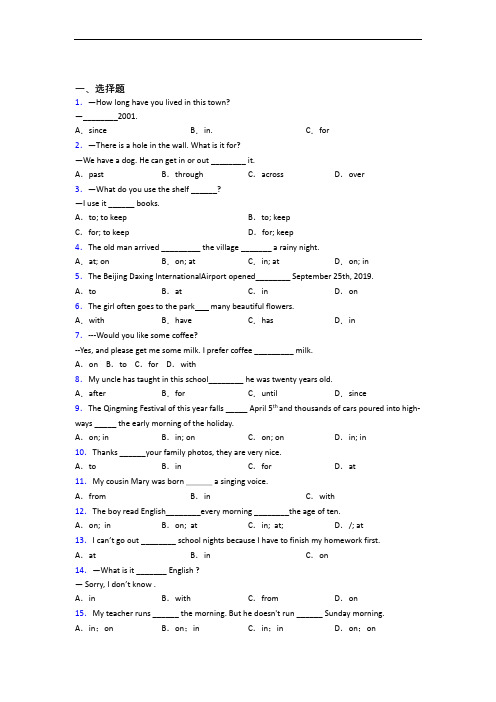
一、选择题1.—How long have you lived in this town?—________2001.A.since B.in. C.for2.—There is a hole in the wall. What is it for?—We have a dog. He can get in or out ________ it.A.past B.through C.across D.over3.—What do you use the shelf ______?—I use it ______ books.A.to; to keep B.to; keepC.for; to keep D.for; keep4.The old man arrived _________ the village _______ a rainy night.A.at; on B.on; at C.in; at D.on; in5.The Beijing Daxing InternationalAirport opened________ September 25th, 2019.A.to B.at C.in D.on6.The girl often goes to the park many beautiful flowers.A.with B.have C.has D.in7.---Would you like some coffee?--Yes, and please get me some milk. I prefer coffee _________ milk.A.on B.to C.for D.with8.My uncle has taught in this school________ he was twenty years old.A.after B.for C.until D.since9.The Qingming Festival of this year falls _____ April 5th and thousands of cars poured into high-ways _____ the early morning of the holiday.A.on; in B.in; on C.on; on D.in; in 10.Thanks ______your family photos, they are very nice.A.to B.in C.for D.at11.My cousin Mary was born ___ a singing voice.A.from B.in C.with12.The boy read English________every morning ________the age of ten.A.on; in B.on; at C.in; at; D./; at13.I can’t go out ________ school nights because I have to finish my homework first.A.at B.in C.on14.—What is it _______ English ?—Sorry, I don’t know .A.in B.with C.from D.on15.My teacher runs ______ the morning. But he doesn't run ______ Sunday morning. A.in;on B.on;in C.in;in D.on;on16.—What is Linda doing?—She is talking ________ the phone with her friend ________ a movie.A.in; for B.on; on C.about; on D.on; about 17.The accident took place ________ a cold February evening.A.on B.in C.at D.for18.It’s very kind ___________ you to lend me your reusable shopping bags.A.of B.for C.to D.with19.If success is a gate, the road this gate must be made up of difficulties.A.towards B.against C.opposite D.beyond 20.—What's the weather _______ in Spring?—Pardon?(什么,请再说一遍)—How is the weather________in Spring?A.like;/ B./;like C.be like;/ D./;be like 21.—It's wonderful, isn't it?— Yes, The large grassland, reaching out far away, looks very beautiful________the blue and clean sky.A.against B.above C.through D.past 22.—Where is Hubei?—It’s _______ the north of Hunan.A.in B.to C.on23.We started out in early spring and headed west the northern part of Asia. A.through B.between C.among D.across24.I want to learn English well beca use I don’t want to talk with foreigners ________ anybody else.A.by B.through C.across D.at25.We have four lessons ________ the morning.A.in B.on C.at D.for【参考答案】***试卷处理标记,请不要删除一、选择题1.A解析:A【解析】【分析】【详解】句意:——你在这个镇上住了多久了?——自2001年以来。
(完整)七年级介词用法

一、表示时间和日期的介词at表示某一时刻或时间上的某一点on表示某一天,某一天的上午、下午或晚上in表示年、季节、月份、周,或泛指上午、下午或晚上;二、表示方位的介词on意为“在……的上面”;over意为“在……(垂直)的正上方”;above意为“在……(不一定垂直)的上方”;under意为“在……(垂直的)正下方”;below意为“在……(不一定垂直)的下方”;near意为“在……附近”;next to意为“紧挨着……”;round / around 意为“在……周围”;by意为“在……旁边”;表示两者的位置关系时in表示“在同一区域内或同一范围内”;on表示“接壤;相邻”;to表示“相离;相隔”,两者不属同一范围,也不接壤。
三、表示延续时间的介词by意为“在……之前;不迟于……”;for意为“历时……之久;持续……”;in意为“在……以后;在……时间内”;since意为“自从……以来;自……以后”;until 用于否定句中,意为“直到……才”,其前的谓语动词多为非延续性动词,用在肯定句中,意为“直到……为止”,其前谓语动词须用延续性动词。
如:他已经当老师9年了。
He has been a teacher ________ nine years. 我已经在这儿住了10年了。
I have lived here ________ ten years ago.他十分钟之后将会回来。
He will be back ________ ten minutes.知道五月,我们才会看到一些花。
We don’t see any flowers ________ May.你必须得在这里站到太阳落下去为止。
You must stand here ________ the sun sets. 我明天早晨八点前必须得到校。
I must be at school ________ eight tomorrowmorning.你能在五分钟之内干完这些工作吗?Can you finish your work _______ five minutes?四、表示方式的介词介词用来表交通,常把by, in, on来用;限定、复数用in / on,by要直通海陆空;(骑马、骑车惯用on,小轿车前in才通)【注】1. by + 交通工具,意为“乘坐……”。
(完整版)初中英语语法介词用法讲解与练习
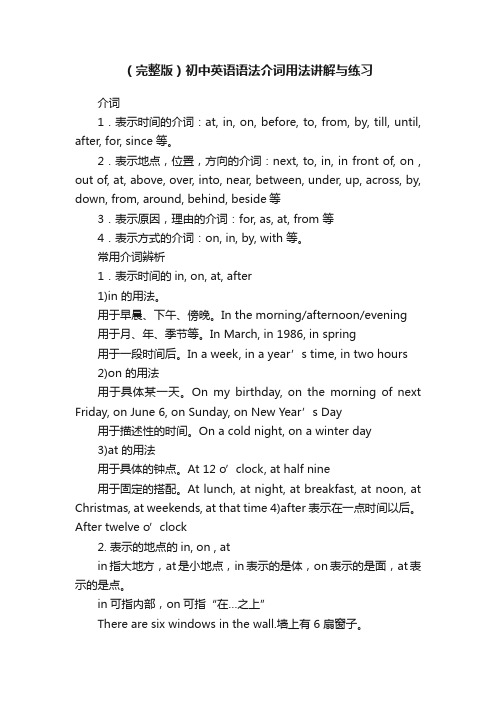
(完整版)初中英语语法介词用法讲解与练习介词1.表示时间的介词:at, in, on, before, to, from, by, till, until, after, for, since 等。
2.表示地点,位置,方向的介词:next, to, in, in front of, on , out of, at, above, over, into, near, between, under, up, across, by, down, from, around, behind, beside等3.表示原因,理由的介词:for, as, at, from 等4.表示方式的介词:on, in, by, with 等。
常用介词辨析1.表示时间的in, on, at, after1)in 的用法。
用于早晨、下午、傍晚。
In the morning/afternoon/evening用于月、年、季节等。
In March, in 1986, in spring用于一段时间后。
In a week, in a year’s time, in two hours2)on 的用法用于具体某一天。
On my birthday, on the morning of next Friday, on June 6, on Sunday, on New Year’s Day用于描述性的时间。
On a cold night, on a winter day3)at 的用法用于具体的钟点。
At 12 o’clock, at half nine用于固定的搭配。
At lunch, at night, at breakfast, at noon, at Christmas, at weekends, at that time 4)after 表示在一点时间以后。
After twelve o’clock2. 表示的地点的in, on , atin指大地方,at是小地点,in表示的是体,on表示的是面,at表示的是点。
初一英语常见介词用法归纳
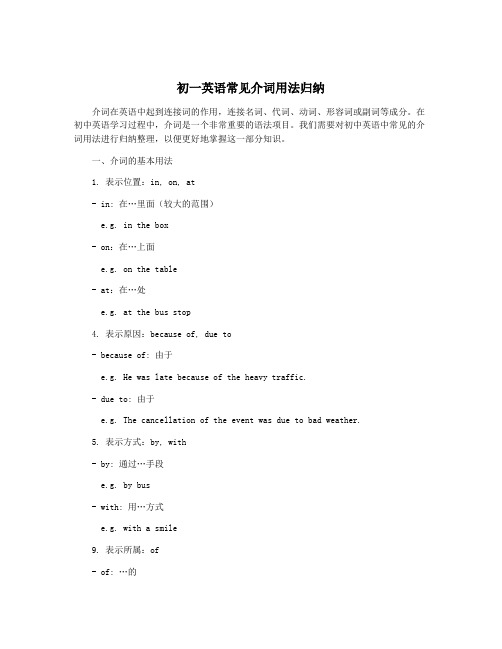
初一英语常见介词用法归纳介词在英语中起到连接词的作用,连接名词、代词、动词、形容词或副词等成分。
在初中英语学习过程中,介词是一个非常重要的语法项目。
我们需要对初中英语中常见的介词用法进行归纳整理,以便更好地掌握这一部分知识。
一、介词的基本用法1. 表示位置:in, on, at- in: 在…里面(较大的范围)e.g. in the box- on:在…上面e.g. on the table- at:在…处e.g. at the bus stop4. 表示原因:because of, due to- because of: 由于e.g. He was late because of the heavy traffic.- due to: 由于e.g. The cancellation of the event was due to bad weather.5. 表示方式:by, with- by: 通过…手段e.g. by bus- with: 用…方式e.g. with a smile9. 表示所属:of- of: …的e.g. the hat of the boy2. look forward to: 期待e.g. I am looking forward to the summer vacation.5. be interested in: 对…感兴趣e.g. Amy is interested in learning Chinese.三、常见介词错误用法及纠正1. 错误用法:depend of正确用法:depend one.g. We depend on each other.通过以上的介词错误用法及纠正,我们可以更清晰地了解该如何正确使用这些介词。
四、综合练习通过上述的综合练习,可以帮助大家更好地掌握介词用法。
初中英语介词知识点归纳

初中英语介词知识点归纳介词是英语中非常重要的一部分,它用来建立词与词、句与句之间的关系,能够使句子结构更加完整且信息更加准确。
在初中英语学习中,了解和掌握介词的用法和常见的搭配是非常重要的。
下面就来归纳一些初中英语中常见的介词知识点。
1. 表示地点的介词常见的表示地点的介词有:at, in, on, under, above, below, near, beside等。
例如:- I live in a big city.- The book is on the table.- The cat is under the chair.- The bird is flying above the tree.- She is standing beside her friend.2. 表示时间的介词常见的表示时间的介词有:at, in, on, before, after, during, for等。
例如:- I go to school at 7 o'clock.- We have a holiday in summer.- She always listens to music before going to bed.- They play soccer after school.- We studied for two hours.3. 表示原因的介词常见的表示原因的介词有:because of, due to, thanks to等。
例如:- He couldn't come because of the bad weather.- The match was canceled due to the heavy rain.- Thanks to your help, I finished my homework.4. 表示目的的介词常见的表示目的的介词有:for, to等。
例如:- He bought a gift for his mother.- She went to the supermarket to buy some food.5. 表示方式的介词常见的表示方式的介词有:by, with等。
初中英语介词语法知识点总结(讲义及答案)
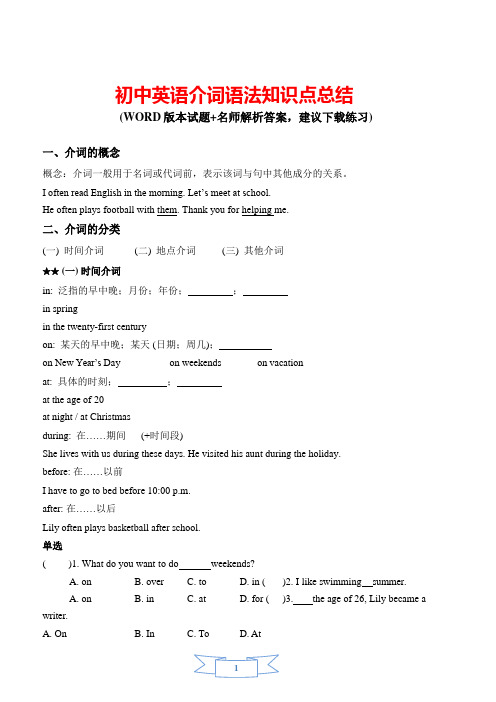
初中英语介词语法知识点总结(WORD版本试题+名师解析答案,建议下载练习)一、介词的概念概念:介词一般用于名词或代词前,表示该词与句中其他成分的关系。
I often read English in the morning. Let’s meet at school.He often plays football with them. Thank you for helping me.二、介词的分类(一) 时间介词(二) 地点介词(三) 其他介词★★ (一) 时间介词in: 泛指的早中晚;月份;年份;;in springin the twenty-first centuryon: 某天的早中晚;某天 (日期;周几);on New Year’s Day on weekends on vacationat: 具体的时刻;;at the age of 20at night / at Christmasduring: 在……期间(+时间段)She lives with us during these days. He visited his aunt during the holiday.before: 在……以前I have to go to bed before 10:00 p.m.after: 在……以后Lily often plays basketball after school.单选( )1. What do you want to do weekends?A. onB. overC. toD. in ( )2. I like swimming summer.A. onB. inC. atD. for ( )3. the age of 26, Lily became a writer.A. OnB. InC. ToD. At( )4. Jim learned to drive ___ the holiday.A. atB. duringC. toD. for( )5. He went to Shanghai July 7, 2013 and came backa cold morning last year.A. in; onB. on; inC. on; onD. in; in( )6. My mom often tells me to go back home dark(黄昏).A. afterB. toC. beforeD. for( )7. A lot of people are here _ vacation every year.A. ofB. onC. atD. with★★ (二) 地点介词1.地点介词 at, in, onat: “在……”(表一个点或小地方)at home at Mr. Cool’s Clothes Storeat the pool at Central Parkin: “在……里” (表一个范围或大地方) in China in Beijing in the water in the parkon: “在……上” (表一个表面,并接触) on the floor on the wall 对比这三个句子:They stood at the door and waited.他们站在门口等着。
初中中的介词用法详解

初中中的介词用法详解介词是一种连接词,在句子中起连接作用,用来表示人、事、物之间的关系。
它在语法中扮演着重要的角色。
在初中阶段,学生们需要掌握常见的介词及其用法,以正确地运用介词,表达清晰准确的意思。
下面将详细介绍初中中的介词用法。
一、介词的基本概念介词是一种虚词,它不能独立作句子的成分,必须与其他词语结合使用。
它可以用于表示时间、地点、方向、原因、目的、手段等关系。
二、表示时间的介词1. at:用于表示具体的某一点时间,比如at 7 o'clock、at noon。
2. on:用于表示某一天、某一日期,比如on Monday、on March 1st。
3. in:用于表示某一段时间、某一年份,例如in the morning、in 2022。
三、表示地点的介词1. in:用于表示大范围的地点,如in China、in the kitchen。
2. on:用于表示具体的平面或位置,如on the table、on the left。
3. at:用于表示具体的位置或地点,如at the bus stop、at the cinema。
四、表示方向的介词1. to:表示朝向某个地点或目的地,例如go to school、send the letter to her。
2. from:表示从某个地点或源头出发,例如come from Japan、receive a gift from my friend。
五、表示原因的介词1. because of:表示由于某个原因,如failed the exam because of laziness。
2. due to:表示由于某个原因产生的结果,例如missed the train due to the traffic jam。
六、表示目的或用途的介词1. for:用于表示目的或用途,例如study hard for a good future、buy flowers for my mother。
初中英语介词的知识点总结
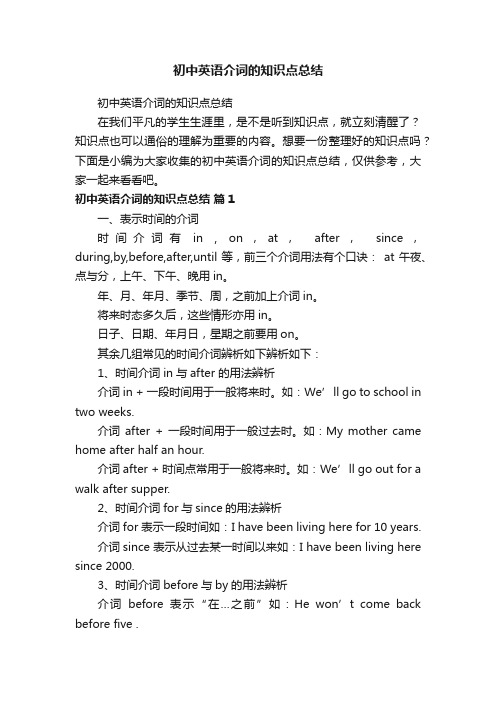
初中英语介词的知识点总结初中英语介词的知识点总结在我们平凡的学生生涯里,是不是听到知识点,就立刻清醒了?知识点也可以通俗的理解为重要的内容。
想要一份整理好的知识点吗?下面是小编为大家收集的初中英语介词的知识点总结,仅供参考,大家一起来看看吧。
初中英语介词的知识点总结篇1一、表示时间的介词时间介词有in , on,at,after,since,during,by,before,after,until等,前三个介词用法有个口诀:at午夜、点与分,上午、下午、晚用in。
年、月、年月、季节、周,之前加上介词in。
将来时态多久后,这些情形亦用in。
日子、日期、年月日,星期之前要用on。
其余几组常见的时间介词辨析如下辨析如下:1、时间介词in与after 的用法辨析介词 in + 一段时间用于一般将来时。
如:We’ll go to school in two weeks.介词after + 一段时间用于一般过去时。
如:My mother came home after half an hour.介词after + 时间点常用于一般将来时。
如:We’ll go out for a walk after supper.2、时间介词for与since的用法辨析介词for 表示一段时间如:I have been living here for 10 years.介词since 表示从过去某一时间以来如:I have been living here since 2000.3、时间介词before与by的用法辨析介词before表示“在…之前”如:He won’t come back before five .介词by表示“到…时为止,不迟于…”如:The work must be finished by Friday.4、时间介词during与for的用法辨析当所指的时间起止分明时用介词during如:He swims every day during the summer.如果一段时间不明确则用介词for如:I haven’t seen her for years.5、时间介词till与until用法的异同till和until用在肯定句中,均可表示“直到…为止”,如:I will wait till(until)seven o'clock.till和until用在否定句中,均可表示“在…以前”或“直到…才”。
【中考英语语法汇总】介词语法讲解
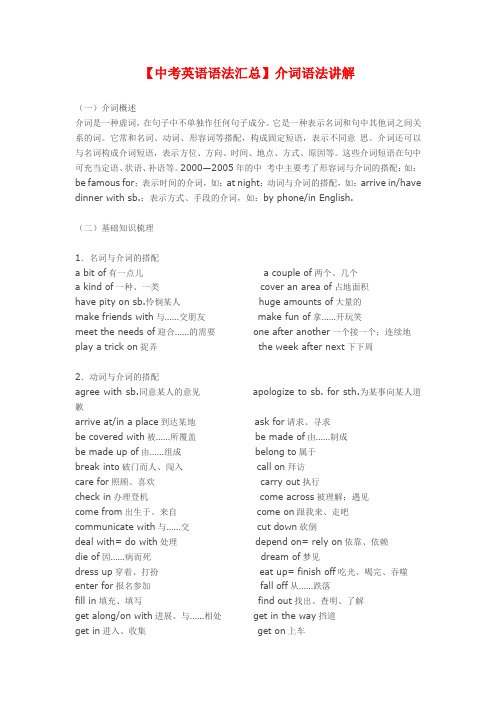
【中考英语语法汇总】介词语法讲解(一)介词概述介词是一种虚词,在句子中不单独作任何句子成分。
它是一种表示名词和句中其他词之间关系的词。
它常和名词、动词、形容词等搭配,构成固定短语,表示不同意思。
介词还可以与名词构成介词短语,表示方位、方向、时间、地点、方式、原因等。
这些介词短语在句中可充当定语、状语、补语等。
2000—2005年的中考中主要考了形容词与介词的搭配:如:be famous for;表示时间的介词,如:at night;动词与介词的搭配,如:arrive in/have dinner with sb.;表示方式、手段的介词,如:by phone/in English.(二)基础知识梳理1.名词与介词的搭配a bit of有一点儿 a couple of两个、几个a kind of一种、一类 cover an area of占地面积have pity on sb.怜悯某人huge amounts of大量的make friends with与……交朋友 make fun of拿……开玩笑meet the needs of迎合……的需要 one after another一个接一个;连续地play a trick on捉弄 the week after next下下周2.动词与介词的搭配agree with sb.同意某人的意见 apologize to sb. for sth.为某事向某人道歉arrive at/in a place到达某地 ask for请求、寻求be covered with被……所覆盖 be made of由……制成be made up of由……组成 belong to属于break into破门而人、闯入 call on拜访care for照顾、喜欢 carry out执行check in办理登机 come across被理解;遇见come from出生于、来自 come on跟我来、走吧communicate with与……交cut down砍倒deal with= do with处理depend on= rely on依靠、依赖die of因……病而死dream of梦见dress up穿着、打扮 eat up= finish off吃光、喝完、吞噬enter for报名参加fall off从……跌落fill in填充、填写 find out找出、查明、了解get along/on with进展、与……相处 get in the way挡道get in进入、收集 get on上车get off下车 get rid of摆脱get ready for为….作准备 get to到达get tired of对……感到厌倦 go in for参加、从事于、酷爱,'^ go ahead先走、向前走;去吧 go for a swim去游泳go on a diet实行节食 go over复习go on with继续做某事 grow up长大、成长hand in上交 hear from收到……的来信hear of听说 help sb. with sth.帮助某人做某事hold on等等(别挂电话)hold up举起hurry off匆忙离开join.n参加、加入keep... from使……不做 keep in touch with与……保持联系keep off阻挡;不让接近 knock over撞倒、撞翻later on过来;后来 laugh at嘲笑learn.., from向……学习 leave for动身去let out放出 line up整队;排成行live on靠……为生look after照顾;照料look at看;观看 look for寻找look forward to期待着 look like看上去像;显得look out of从……朝外看look up查寻;抬头看make out辨认出make up one's mind下决心meet with遭遇 operate on sb.为……动手术pay for付……钱 pick out拾起play with玩弄point at指向;指着point out指出praise sb. for sth.为某事表扬某人prefer... to(比起……来)更喜欢 prepare for准备protect... from保护……免受 pull down推倒put off延期put on穿;戴上;上演put out伸出 put up举起;挂起run after追捕;追踪 run away逃跑search for搜寻;搜查see off为……送行sell out售完 set out/off for出发去……;起程去……set up建立;设立. shake hands with与……握手share with与……分享show off炫耀show sb around带某人参观 shut up住口speed up加快速度stop...from阻止……做take away拿走 take care of照料take charge of负责;管理;take hold of抓住take in吸入 take off脱掉(衣物等);起飞take out取出take part in参加take up开始从事 talk about谈到talk to/with与...谈话 tell... from区别;分辨think of想起;想到 think over仔细考虑throw away扔掉 tie up捆绑try on 试穿turn down(把音量)调低turn into变成 turn off关掉(电灯、电视、收音机等)turn on开,旋开(电灯、电视、收音机等) turn over翻车;翻阅;翻身turn out结果是;证明是 wake up醒来;叫醒wait for等待;等候 write down写下work out算出;制定出经典例题:1.The foreigners arrived __________Shanghai __________ night.A. at…atB. in…atC. in... inD. at... in2. Wushu is becoming more and more popular __________ westerners.A. amongB. betweenC. inD.within3. __________ the help of the teachers, we decorated. Ourclassroom__________lanterns, flowers and pictures yesterday.A. Under... withoutB. Under... amongC. With... withD.With...between4. The cakes __________ the shape of a round moon is called mooncakes.A. likeB. look likeC. asD. likes5.改错:The manager told his secretary that he would be back __________ three-thirty.A. inB. afterC. beforeD. at6. It was clever __________ the boy to work __________ the mathsproblems in less than ten minutes.A. for…outB. of... outC. for...onD. of... on7. My aunt Jane tried her best to reduce her weight ________ 6kg.A.about B.at C.to D.by8. In my opinion, I agree __________ you __________that.A. to… withB. with…toC. with.., withD. with.., on9. I am familiar__________ this school since I have worked here for morethan fifteen years.A. withB. toC. aboutD. of10. Would you please look __________ my baby girl __________ myabsence?A. after…duringB. for…duringC. after… inD. to...in11. Mexico is ________ the south of America.A. inB. toC. onD. of12. The boy ____ the bike is Jackie Hu from Britain.A. byB. onC. inD. with13. Smoking and drinking are not good _______ your health.A. forB. toC. ofD. at14. Can you see the cat hiding __________ the tree?A. onB. underC. overD. in15. The litter bin__________ the corner of the room is a present from mybrother.A. atB. onC. inD. among16. It's fun to see a large number of stars shining in the sky ________ aclear night.A. atB. inC. onD. of1. 【解析】答案是B。
初中英语知识点归纳常用的介词和介词短语

初中英语知识点归纳常用的介词和介词短语介词是一种连接词,位于句子中,可以表达位置、方向、时间、原因、目的等含义。
在英语学习中,熟练掌握常用的介词和介词短语是非常重要的。
本文将对初中英语中常用的介词和介词短语进行归纳总结,帮助读者更好地理解和运用。
一、位置和方向类介词1. in :表示在某个具体空间或范围内e.g. in the room(在房间里)2. on :表示在某个平面或垂直面上e.g. on the table(在桌子上)3. at :表示在某个位置或地点e.g. at the park(在公园)4. under :表示在某物体的下方e.g. under the chair(在椅子下面)5. above :表示在某物体的上方e.g. above the clouds(在云层上)6. behind :表示在某物体的后方e.g. behind the door(在门后面)7. in front of :表示在某物体的前方e.g. in front of the building(在建筑物前面)二、时间类介词1. at :表示具体的时间点e.g. at 8 o'clock(在8点钟)2. on :表示在某一天或日期e.g. on Monday(在星期一)3. in :表示在某一段时间或月份e.g. in the morning(在早上)4. after :表示在某个时间之后e.g. after school(放学后)5. before :表示在某个时间之前e.g. before dinner(晚饭前)三、原因和目的类介词1. because of :表示由于某个原因e.g. He couldn't come because of the bad weather.(因为天气不好,他不能来。
)2. thanks to :表示由于某个好事发生e.g. Thanks to his help, I passed the exam.(多亏了他的帮助,我通过了考试。
(完整版)初中英语介词用法全

初中阶段介词用法汇编※一、表示时间的介词:1、at、on、in“at时间点,有on必有天,in指月季年,也和色相连”就是说,有具体的时间点的时候用at,具体那一天用on,说到月份,季节,年份,就用in ;而且说谁穿了什么颜色的衣服的时候,也是用in XX(color)】at用于某一具体时刻或重大节日之前①在五点钟______②在中午________③在夜晚________④在圣诞节________⑤在午夜_________【答案】①at five o’clock ②at noon ③at night ④at Christmas ⑤at midnight(2)on用在具体某一天或某天的上午、下午、晚上之前①在国庆节_________②在周二晚上_________③在星期天_________【答案】①on National Day ②on Tuesday evening ③on Sunday(3)in用在周、日、季节或泛指的上午、下午、晚上前①在一周内_________②在五月_________③在夏季_________④在2009年_________⑤在下午_________ 【答案】①in a week ②in may ③in summer ④in 2009 ⑤in the afternoon归纳总结在初中阶段常见的固定短语in English用英语 in a minute一会儿、立刻 in a short while一会儿、不久in a hurry匆匆忙忙 in danger在危险中 in full全部地、详细地in a word一句话 in all总共 in every case不管怎样in the end最后 in spite of尽管 in person亲自in fact事实上 in good health身体健康的 in front of在……前面in some ways在某些方面 in common共同的 in public当众☆考题再现:---Who was the first man with A(h1n1) flu in mainland China know for sure?---________May 11,2009.A InB OnC ForD Since【答案】B 【解析】在具体的某一天用on2、before、afterbefore表示“在某时刻或某件事之前”,after用在时刻或某件事之后。
初中英语语法介词知识点汇总

介词介词是一种虚词,不能独立充当句子成分,需与动词、形容词和名词搭配,才能在句子中充当成分。
介词是用于名词或代词之前,表示词与词之间关系的词类,介词常与动词、形容词和名词搭配表示不同意义。
介词短语中介词后接名词、代词或可以替代名词的词(如:动名词v-ing).介词后的代词永远为宾格形式。
一、表示时间的介词(一)表示时间段的介词(1)in , afterin +时间段,表示从现在起往后推算一段时间after +时间段,表示过去某时间往后推算一段时间,如:He’ll come back in two days. 但点钟用after( after three o’clock)He left on July 2 and returned after three days.(2)in , during表示在一段特指的时间内,可用in 或duringThe work was done in / during the holidays.表示年份、月份、季节用in , 如:in 1999 ,in June , in winter(3)in last, for the past + 时间段, during表示在最近一段时间内,句中谓语动词常用现在完成时I have been in Shanghai in the last few years.(4)for 表示延续一段时间。
I’ll study in the U.S for two yearsI’ve waited for Bingo for half an hour.(二)表示某一时间的介词(1)at, onat 表示某一时刻,on 表示某一天或日期, 如:at 7:14, on Saturday morning on the night of May2一天内各段时间表达, 选用正确的介词,请比较:in the morningon a winter / snow / cold / morningat nighton the night of March 7thin the eveningon Friday evening(2)before, bybefore 表示某一时间之前,而by 表示到某一时间止,句中谓语动词多用完成时态。
初中英语介词用法归纳总结
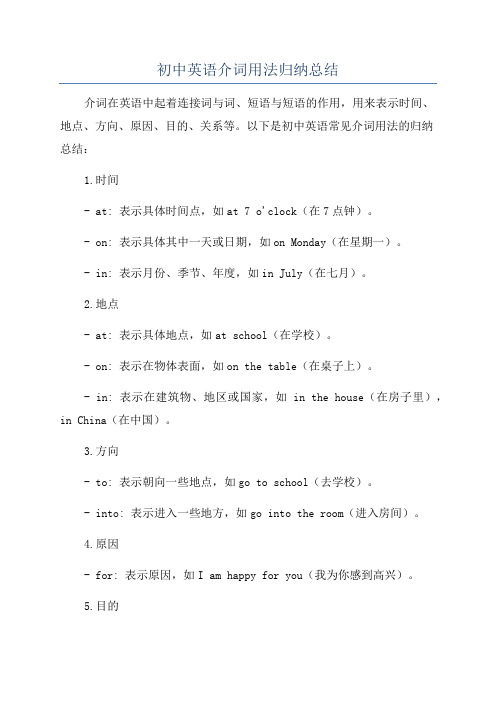
初中英语介词用法归纳总结介词在英语中起着连接词与词、短语与短语的作用,用来表示时间、地点、方向、原因、目的、关系等。
以下是初中英语常见介词用法的归纳总结:1.时间- at: 表示具体时间点,如at 7 o'clock(在7点钟)。
- on: 表示具体其中一天或日期,如on Monday(在星期一)。
- in: 表示月份、季节、年度,如in July(在七月)。
2.地点- at: 表示具体地点,如at school(在学校)。
- on: 表示在物体表面,如on the table(在桌子上)。
- in: 表示在建筑物、地区或国家,如in the house(在房子里),in China(在中国)。
3.方向- to: 表示朝向一些地点,如go to school(去学校)。
- into: 表示进入一些地方,如go into the room(进入房间)。
4.原因- for: 表示原因,如I am happy for you(我为你感到高兴)。
5.目的- to: 表示目的、去干事,如I am going to the park(我要去公园)。
6.关系- with: 表示伴随关系,如go shopping with friends(和朋友一起去购物)。
- of: 表示所属关系,如the book of Tom(汤姆的书)。
7.其他常见用法- by: 表示乘坐交通工具,如go to school by bus(坐公交车去学校)。
- through: 表示穿过,如walk through the park(穿过公园)。
- with: 表示伴随,如I am with my family(我和我的家人在一起)。
以上是初中英语常见的介词用法归纳总结,但并不是固定的规则,在具体语境中可能会有一些例外。
因此,在学习和使用介词时,还需要根据具体情况进行判断和运用。
- 1、下载文档前请自行甄别文档内容的完整性,平台不提供额外的编辑、内容补充、找答案等附加服务。
- 2、"仅部分预览"的文档,不可在线预览部分如存在完整性等问题,可反馈申请退款(可完整预览的文档不适用该条件!)。
- 3、如文档侵犯您的权益,请联系客服反馈,我们会尽快为您处理(人工客服工作时间:9:00-18:30)。
初中英语介词讲解1.介词的含义,介词(虚词),不能在句子中独立充当成分。
它总是用于名词、代词、或相当于名词的其它词类或短语活从句前。
中考需要掌握的11个介词:in、on、at、to、from、by、with、for、about、after、before表示时间的介词A.典型例题:1.in 1996 / in 2002 / in 1847(年份)2.in October / in February / in March (月份)3.in spring / in summer / in autumn / in winter (季节)4.in a week / in a year 在1周/ 年中5.in the morning / in the afternoon / in the evening 在上午/ 下午/ 晚上in those days 在当时/ in no time 立刻/ in the daytime 在白天/ in the future 在将来/ in one minute 在1分钟内/ 最后in the end表示较长时间(长于一天或短于一天)如:年、年份、月份、季节、周、上午、下午、晚上以及一些习惯用法中要用介词“in”。
-------------------------------------------------------------------------------------------------------------------------------- B.典型例题:1.at ten o’clock / at seven thirty. (表示某一钟点)2.at noon / at night / at midnight (在中午、晚上、半夜――一天中相对短暂的时间)3.at the age of twenty / at the age of thirty-five (表示某一年龄)4.at that time 在那时/ at the moment 这时、那时、此刻/ at first 首先/ at last 最后=in the end/ at once 立刻、马上/ at / on (the) weekends 在周末/ 在一年中的这个时候at this time of year / 在……开始/结束时at the beginning /end of表示时间的某一点(或表示某时刻)如:钟点、年龄或其它的习惯用法中要用“at”。
-------------------------------------------------------------------------------------------------------------------------------- C.典型例题:1.on Monday / on Tuesday / on Wednesday / on Friday2.on January 1 / on April 18 / on May 313.on January 1, 1988 / on April 18, 2002 / on May 31,19774.on Monday morning / on Tuesday afternoon / on Wednesday evening5.on a winter morning / on a summer evening / on a autumn afternoon6.on the morning of May fifth7.on my birthday / on that day / on New Year’s Day / on the first two days / on Christmas Day8.值日on duty / 准时on time /表示某一天或者特定(某一天上下午)的时间用介词“on”。
-------------------------------------------------------------------------------------------------------------------------------- D.典型例题:1. for two hours / for three days2. for hundreds of years3. for the last three years / for the past three years4. for a while表示持续一段时间用介词“for”。
“for”+“段时间”-------------------------------------------------------------------------------------------------------------------------------- E.典型例题:1. from 9 o’clock to 11 o’clock2. from February to April3. from 1980 to 19904. from then on从那时候起(用于一般过去时),from now on从现在起(用于一般将来时),from time to time 时不时地表示从一点时间到另一点时间的一个阶段用介词“from … to …”-------------------------------------------------------------------------------------------------------------------------------- F.典型例题:1. during the week2. during those three months3. during my visit4. during the holidays / meeting5. during the spring表示“在……的期间”要用介词“during”,during表示在特定的时间里,其后的名词前要用定冠词或者表示特定意义的代词。
-------------------------------------------------------------------------------------------------------------------------------- G.典型例题:1. since 1986 / since 19772. since last summer / since last week / since last month3. since then 从那时以后4. since he came here 自从他来了以后表示“自……以来”,表示从过去某一时刻到现在,用介词“since”。
“since”+“点时间”,主句常用现在完成时。
巩固练习:1.since 7 o’clock2.since last Monday-------------------------------------------------------------------------------------------------------------------------------- H.典型例题:1.The park is open til l 5 p.m.2.He didn’t leave the park until 4 p.m.表示某动作或者状态延续到某一时间终止,用介词“till / until”-------------------------------------------------------------------------------------------------------------------------------- I.表示时间介词的比较1.典型例题:1.The train leaves at 8 o’clock, so you’d better be there by 7:50. 火车八点钟开,所以你最好八点五十以前赶到那儿。
2.He left Shanghai at the end of last year. 去年年底他离开了上海。
(过去式)3.By the end of last year he had finished the work. 到去年年底,他已经完成了工作。
at表示事件发生在某一时间点上;by表示事件发生在某一时间点前。
at the end of + 时间/ 地点,表示时间时,一般用于一般过去式。
by the end of + 时间,表示时间时,一般用于过去完成时。
in the end =at last最后-------------------------------------------------------------------------------------------------------------------------------- 2.典型例题:1.He finished the work three days ago.2.He said he had finished the work three days before.3.He will finish the work in three days.4.Three days later he finished the work.three days ago表示从今天算起三天前;three days before表示从过去某个时间开始算起的三天前;in three days表示从今天算起的三天以后Three days later表示从过去某个时间开始的三天后;。
ago,用于一般过去式;before,用于过去完成时;in用于将来时。
巩固练习1.Four days later he came back from Beijing.-------------------------------------------------------------------------------------------------------------------------------- 3.典型例题:1. before 2 o’clockthe meetinglunch1990 before后通常跟表示一点的时间(或特定的时间),表示在某个时间之前National Day2. after 2 o’clockthe meetinglunch1990 after后通常跟表示一点的时间(或特定的时间),表示在某个时间之后National Day由before和after构成的时间介词短语都不能用于现在完成时。
